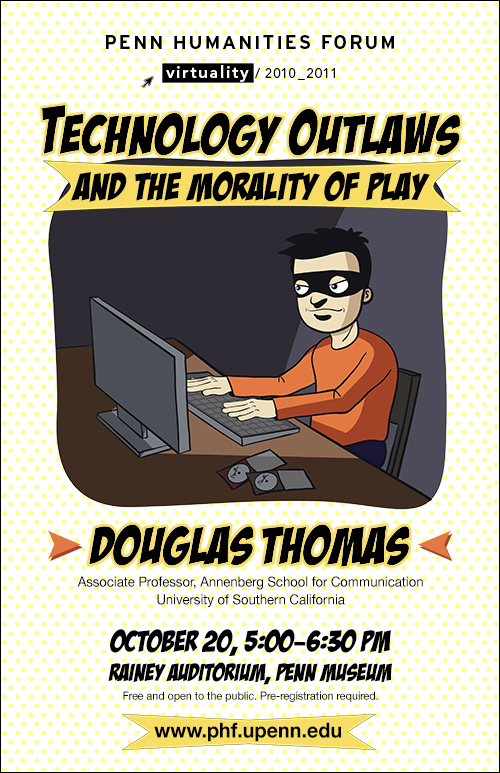Gamers, hackers, and virus writers inhabit a world where the law has failed to keep pace with technology and where individuals are often responsible for creating and defending their own moral codes. How does technology both liberate and constrain these “outlaws”? Cyberculture scholar Douglas Thomas examines issues of right and wrong in zones of digital ambiguity and describes the construction in these zones of a new “moral economy of play.”
Douglas Thomas is associate professor in the Annenberg School for Communication at the University of Southern California and a fellow at the USC Annenberg Center. He received his Ph.D. from the University of Minnesota in communication in 1992 and specializes in critical theory and cultural studies of technology. His current research focuses on the uses of games and virtual worlds for education and global civic engagement.
He is founding editor of Games & Culture: A Journal of Interactive Media, and is author of Hacking Culture (University of Minnesota Press, 2002); Reading Nietzsche Rhetorically (Guilford Press, 1998); Technological Visions: The Hopes and Fears That Shape New Technologies (with Marita Sturken and Sandra Ball-Rokeach, Temple UP, 2004); and Cybercrime: Law Enforcement, Security and Surveillance in the Information Age (with Brian D. Loader; Routledge, 2000). He is currently writing for publication The New Culture of Learning (with John Seely Brown); Power, Play and Performance: Studying Virtual Worlds; and Play and Politics: Games, Civic Engagement, and Social Activism.
Professor Thomas is a founding member and has served as chair of the critical and cultural studies division of the National Communication Association. He also has served as the vice-president of the Digital Games Research Association (DiGRA) and program chair for the ACM/SIGGRAPH Video Game Symposium. He has testified before the U.S. Congress on issues of computer hacking, cyberterrorism, and critical infrastructure protection.
Associate Professor, Annenberg School for Communication
University of Southern California



